Books with Character, Veronica Mars, djinns and Space Spies!

Hello!
This letter is coming a bit later than usual: I’ve been thinking that I want to shift this to a Monday delivery, and ended up getting caught up in a home-improvement project all day yesterday. I’ve got a couple of things for you today: books that I can’t bear to get rid of, some thoughts on Veronica Mars season 4, and short reviews of Dan Moren’s The Bayern Agenda and Saad Z. Hossain's The Gurkha and the Lord of Tuesday.
Books with Character
I’ve been cleaning out bookshelves lately: I just did a big purge of ARCs and review copies, but also on my regular shelves, pulling off stuff that I felt I could get rid of without mental angst. It got me thinking about the books that I do hold onto, not just because I like their contents, but because I just like them as an *object*. There’s a bunch of those, but it got me thinking: what are the coolest books that I own? Which ones have character?
I scanned my shelves, and pretty quickly figured them out. Here’s what I came up with.
Ivanhoe by Sir Walter Scott
I’ll confess, I’ve never read this book, but I picked it up at a now-defunct bookstore in Northfield (RIP — this was seriously one of the best bookstores I’ve ever been in) on the cover alone. It’s a simple, chunky paperback novel from 1961. It’s a beautiful copy, well-worn, and I’ve carried it with me through at least one move. It’s one of those books that I’ve wanted to read, but just haven’t really had a chance to dig into it.
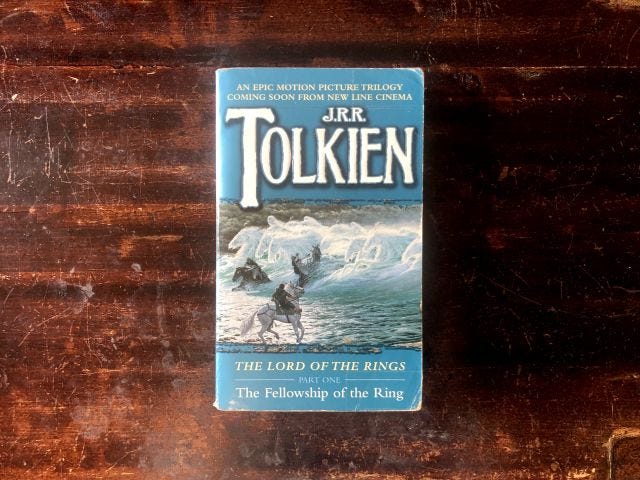
The Fellowship of the Ring by J.R.R. Tolkien
I was literally overjoyed when I found this copy the other day when I was looking around for something else. For years, I thought that I’d gotten rid of it in one of my other book purges, and it’s one of those rare times that I’ve regretted parting with a book. It’s the copy that introduced me to Tolkien’s works in high school, a regular Del Rey paperback that came out prior to Peter Jackson’s film trilogy. I’ve got … at least three copies of the Lord of the Rings (an omnibus, and a pretty set of illustrated hardcovers, as well as these mass-market paperbacks.) There’s a lot of love wrapped up in the covers here. The spine is broken and creased (which I hate doing to books), and the artwork is superb. The next set of editions were movie tie-ins with pictures from the film, and more recent editions are all abstract and shit. These covers convey the best of fantasy cover art: wonderfully detailed, dynamic, and entrancing.
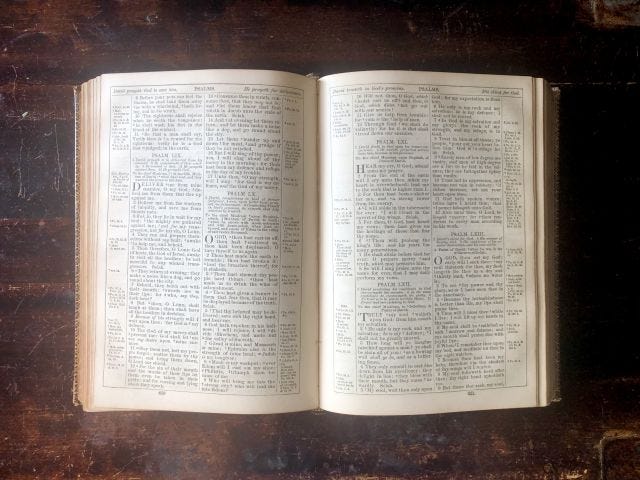
Holy Bible
I’m not a terribly religious person, but when I came across this copy of the Holy Bible, I couldn’t resist picking it up. For one, it was printed in 1868, making it the oldest book I own. The interior is beautiful as well: the typography is simple, and there are a handful of hand-written notes scattered throughout it on other pieces of paper (as well as 3-4 four-leave clovers, for some reason.)
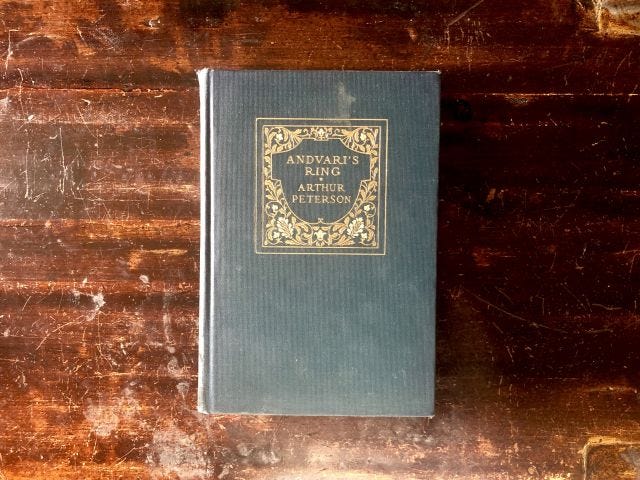
Andvari’s Ring by Arthur Peterson
This was another Northfield Bookstore find. It’s a small, green book with gold inlay, and it’s one of those simple, unassuming books that packs an incredible story into it — probably the only poem I’ve ever willingly read.
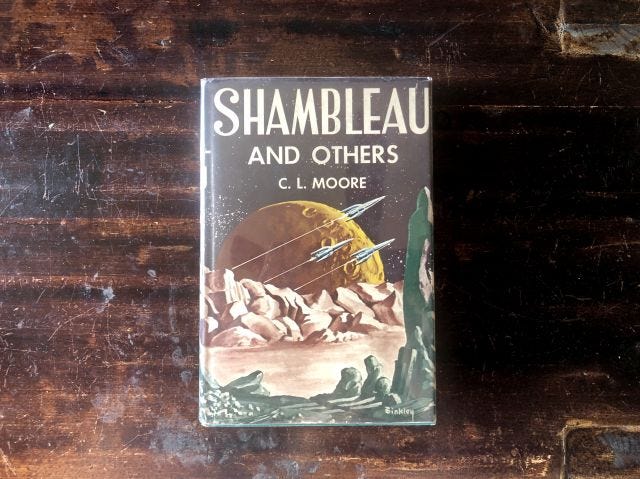
Shambleau and Others by C.L. Moore
A couple of years ago, I wrote a column for Kirkus Reviews about the history of science fiction, and since then, I’ve hunted around for neat books about the genre’s past. One of the authors I wrote about was C.L. Moore, one of the first women to write in the genre, and for “research”, I found a first edition of one of her collections, which rounded up a bunch of her best stories. This particular edition is in wonderful condition, and was published by Gnome Press, something that I’d also written about (and was probably one of my favorite columns for Kirkus at the time.)
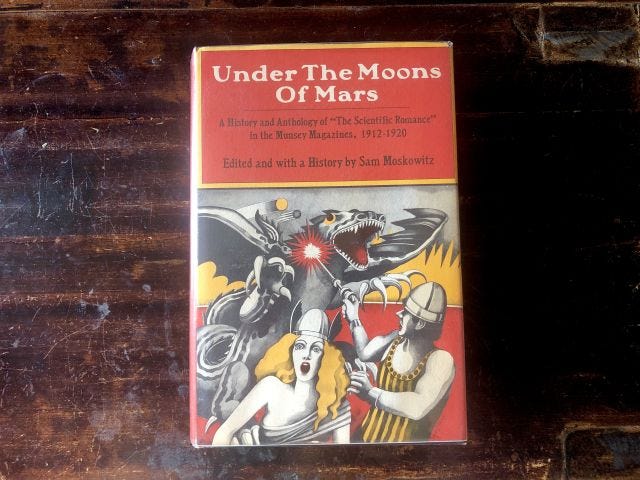
Under the Moons of Mars: A History and Anthology of “The Scientific Romance” in the Munsey Magazines, 1912-1920 edited by Sam Moskowitz
This was a find in a hole-in-the-wall bookstore in Syracuse NY, which I found when I visited for World Fantasy Con (or was it a Neil Gaiman talk? I can’t remember) probably a decade ago. This book is really something: a collection of short stories from the early part of the century, right when the genre was kicking off, bundled together with some history for context. The cover is wonderful, and the book is in superb condition.
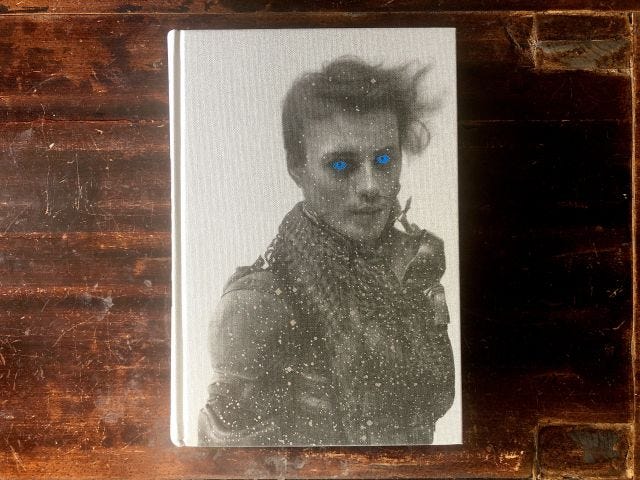
Dune by Frank Herbert
Dune was one of my favorite novels in High School, and I’ve owned a couple of copies over the years — one of Ace’s mass-market paperbacks, as well as a neat Barnes & Noble edition. But this one comes from The Folio Society, and it’s a gorgeous volume. It comes in a nice slip-case, some beautiful original art, and pages that are simply wonderful to read. I’ve been meaning to re-read the novel, and I’m looking forward to digging into this particular volume again.
That’s just a handful. Anyone who’s visited me will know that they’ve gotten a tour of the shelves. But I want to hear from you: What’s the coolest book you own, and why what makes it special?
The Return of Veronica Mars
The last couple of weeks, I’ve been caught up in binging Veronica Mars ahead of its revival at Hulu. The show occupies a special place for me. I picked it up mid-college, watching the first two seasons on DVD just as it ended up getting cancelled, and I was particularly enamored of its music selection, noir stylings, and characters, and I’ve been one of those fans that have wanted it to return in some form. I backed the film when it was on Kickstarter, and I was particularly excited when Hulu announced that it was bringing the show back.
Hulu also began streaming the first three seasons on its platform, and I went through the entire thing. I’m astounded at how well the show holds up, story and technology-wise. Remember, it aired in 2004-2007 — Facebook was *just* starting up, the iPhone and other smartphones weren’t out yet, and so forth. Yet, the show covers a variety of things that we’re still grappling with: revenge porn, wealth inequality, sexual assault, privacy, and so forth. There are certainly moments that haven’t aged well, and the film is surprisingly forgettable, but on the whole, it’s a show that’s still very fresh and relevant, even a decade-and-a-half later.
That makes the continuation of the show doubly interesting to me: how do you take a show that operates on a rather specific formula (high school girl solving crimes while she navigates school), and pick up the characters much later on?
Season 4 picks up Veronica's life in real-time. She’s older and more experienced, and still works as a PI in Neptune, California with her dad. A series of bombings have rattled the town midway through the peak of its spring break tourist season, and the two are pulled in to help figure out who is blowing up college students.
Along the way, there’s some pretty heavy commentary on the imbalance between rich and poor: in the pilot, Veronica describes Neptune as a town without a middle class, and that’s just become exacerbated now. A rich developer wants to gentrify the beachfront, forcing out the people who are barely getting by — including Veronica, Logan, and her dad.
The show deviates from its original formula, and feels like a much broader reset for Hulu to build off of moving forward. Where the 2014 film was a nostalgia-trap for devoted fans — the plot dealt heavily with Veronica’s classmates years after they graduated — this one brought back some required cameos, but wasn’t necessarily using them and their pasts to drive the plot forward. (It’s more like you’re just running into people because you all live in the same town.) The season has been shortened to 8 episodes (As opposed to the 22-23 episodes in each prior season.) There’s some trade-offs here. The first three seasons featured a main, overarching mystery that was carried along by largely standalone episodes, in which Veronica would solve some sort of problem brought to her by life events or her classmates. This was a bit before LOST really hammered home that people will follow serialized television.
In season 4, the focus is on the main mystery, and we lose the standalone mysteries. I think the show loses something in that. We don’t see as much of the town and the other characters that did a lot of side work in building up the world and generating relatable characters. This season is good, but it feels abbreviated, not allowing Veronica and Logan to really breathe (which shortchanges a couple of things that happen at the end of the season.)
Overall, it’s nice to see Veronica and her friends back, and I hope that we’ll see more coming from Hulu in the future. Most of all, it’ll be interesting to see where Rob Thomas and the writers will take her as an adult, and I hope that they allow her to grow a bit.
The Bayern Agenda
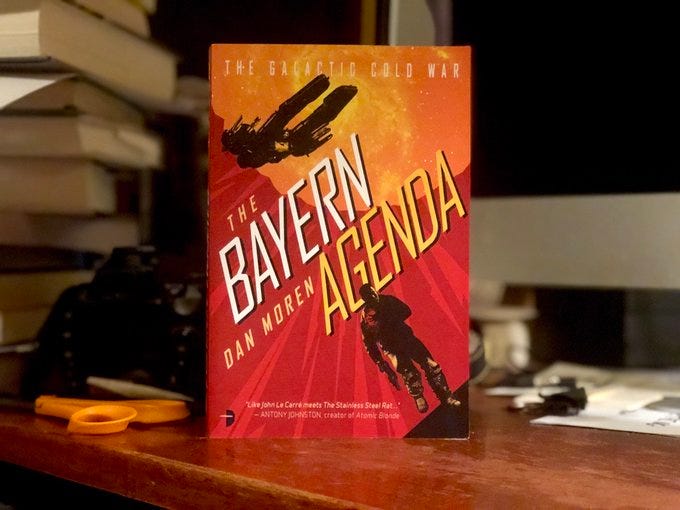
One of the books I’ve been picking away at lately is Dan Moren’s The Bayern Agenda, a quasi-sequel to his debut, The Caledonian Gambit, which I haven’t read. Moren jumped publishers, so the marketing here downplays their connection a bit, and you can read this one without reading the other.
In it, we’re introduced to a global cold war: the Illyrican Empire and Commonweath of Independent Systems are fighting with one another, and when the Illyrican Empire sends emissaries to the Bayern Corporation, a planet-sized bank, the Commonwealth sends its own agents to check it out. Agent Simon Kovalic is forced to hand over his intelligence team to his ex-wife, Lt. Commander Natalie Taylor when he’s injured, who brings in former Illyrican pilot Elijah Brody. When things go sideways, Kovalic is brought in to try and get them out.
The book is a solid military science fiction thriller, and it trades off power armor for spycraft. I’d describe it as John le Carré meets Battlestar Galactica or The Expanse. The book is a measured one: it’s a gripping read, but Moren takes his time getting to some of the action, jumping from character to character, until events really heat up in the last third or so of the read. The book is clearly set in a large world, and I felt like I didn’t absorb much of it, unfortunately, but it feels like it’s a durable enough place that more of that will come out in upcoming installments. (A sequel, The Aleph Extraction, is coming out next March.)
Overall, I enjoyed it. The book reminded me a bit of books like Chris Bunch’s Star Risk Ltd., a fun action space opera series that I picked up in high school, and as I noted on The Verge, it’s the best sort of summer science fiction read: something that isn’t exactly mind-blowing science fiction that will tilt the future of the genre in any particular direction, but which is a perfectly fine adventure. That’s something I’ve always thought was important: sometimes, you just need a fun read.
The Gurkha and the Lord of Tuesday
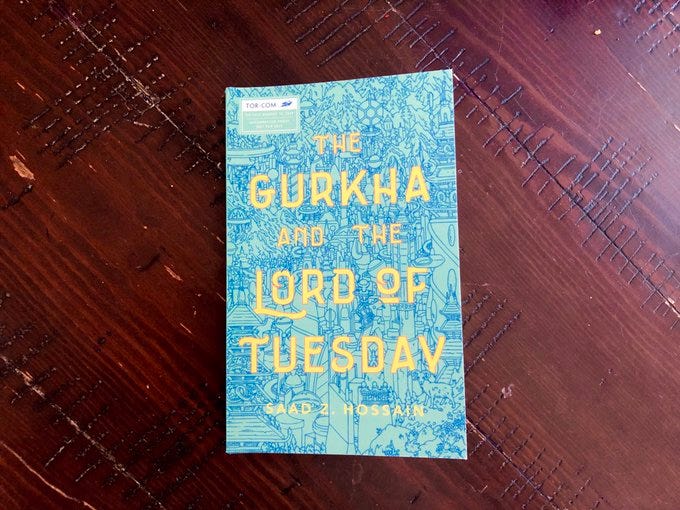
Another book I read recently was Saad Z. Hossain's The Gurkha and the Lord of Tuesday, a tremendously funny blend of science fiction and fantasy. In it, a djinn, Melek Ahmar, the Lord of Mars, the Red King, the Lord of Tuesday, Most August Rajah of Djinn, awakes after being trapped for thousands of years in the Himalayas, and discovers that the world that he remembered is long gone. Climate change has wrecked the world, and a nearby city is a technologically-advanced, post-capitalist society that's run by an advanced artificial intelligence.
Melek teams up with Bhan Gurung, a former Gurkha in self-imposed exile, and recruits him to take over the city. He tries to push the city into a rebellion to take over as its local deity, only to find that people are pretty content. But, Bhan raises red flags: he had brutally murdered a whole bunch of people right before the introduction of the AI, and the two unravel the mystery, which goes right to the core of the society.
This is a really fun, but thoughtful book — there's a lot to chew over in here, and I hope that Hossain will continue to explore this world a bit.
Further reading
- August reading. I’ve rounded up 10 SF/F books for The Verge, including new ones from R.F. Kuang, Christopher Brown, and others. There are some good-looking ones in here. I haven’t read Brown’s earlier book, Tropic of Kansas, but I’m intrigued by Rules of Capture, and it’s getting a ton of buzz.
- Broken Earth RPG. Green Ronin Publishing is cooking up a roleplaying game for N.K. Jemisin’s Broken Earth trilogy. Jemisin set up a huge world in that trilogy, and there are some neat elements of the world that feel as though they’d suit players well for an RPG. I have Green Ronin’s Expanse RPG, and I’ve been wanting to set up a game.
- Capitalism and literature. This is a really fascinating piece about how mega-publishers have left some sort of imprint on the books that they publish.
- Dragon Award Nominees: DragonCon has released its nominees for this year’s Dragon Awards, which will be announced at the upcoming convention. It’s an … interesting mix of authors, and is more of a personality contest than the Hugos. There are a number of books that I’m a little surprised made it onto the list, given that the awards were designed as a sort of anti-Hugo: A Memory Called Empire and Record of a Spaceborn Few are two I was surprised to see (they’re both fantastic!) because they’re the types of stories that the anti-Hugo crowd detested. I’m also a little bummed not to see Mary Robinette Kowal’s Calculating Stars on there, because while it’s exactly the sort of novel that the Sad/Rabid Puppy crowd wouldn’t like, it’s an excellent hard science fiction novel.
- Fantasy logistics. Mollie M. Madden has a neat post up on SFWA’s blog urging fantasy authors to pay attention to the non-combat elements of military stories. Namely, logistics.
Now that you have those answers it’s time to think about how big of an army your world can actually support.
Just as an example, let’s use humans. The average human needs the caloric equivalent of 3 lbs. of bread and half a gallon of water per day (obviously, a human should have a more varied diet, but let’s keep it simple for the math). Doesn’t sound like that much. How big is that army again? 10,000 strong, you say? That’s 30,000 lbs. of bread. Daily.
I’d argue much of the same is relevant for military SF, something that I don’t always see in the subgenre.
- JRPG Inspiration. My buddy Aidan Moher (who used to write A Dribble of Ink) wrote up a really interesting long read about how Japanese RPGs inspired a whole bunch of fantasy authors. Tolkien is often the inspiration for epic fantasy, but he points out that the atmosphere and mechanics of games like Final Fantasy left a big impression as well.
Alongside genres like point-and-click adventures and sprawling computer-based like Ultima and Baldur’s Gate, Japanese RPGs were at the forefront of wrapping their gameplay around a central narrative. The experience of playing these games was as much about the story as the systems and mechanics.
- New Ken Liu! Tor.com unveiled a forthcoming book from Ken Liu — The Hidden Girl and Other Stories, a followup to his first collection, The Paper Menagerie and Other Stories. In other Ken Liu news, he’s finished up his long-awaited finale for his Dandelion Dynasty trilogy.
- Tensorate Review. I recently finished reading JY Yang’s Tensorate series, and wrote up a review for The Verge. It’s a fantastic collection of short books, and it’s a really neat example of how you don’t necessarily need a doorstop of a fantasy novel to convey a really compelling story and world.
- Toxic legacy. Fantasy author Myke Cole has a fantastic feature about the fetishization of Sparta, and how its iconography pops up in a lot of right / alt-right places. It’s a good highlight of how stories can take on a life of their own, and become completely detached from reality — something I see in the intersection of politics and history all the time. I feel like a lot of what history is becoming is fixing misconceptions that get laid down in high school.
Currently reading
I’m reading a handful of books right now, trying to get back on track for the year. I’ve started reading Oliver Morton’s The Moon: A History of the Future, G. Willow Wilson’s The Bird King, and J. Michael Stracznski’s memoir, Becoming Superman. I also have W.M. Akers’ Westwide that I started a couple of months ago and want to keep reading. I mentioned that I purged a bunch of books, but my pile of books that I *want* to get to is still disgustingly long.
That's all I've got for today. Off to the library for the afternoon for some more work on the book.
Andrew